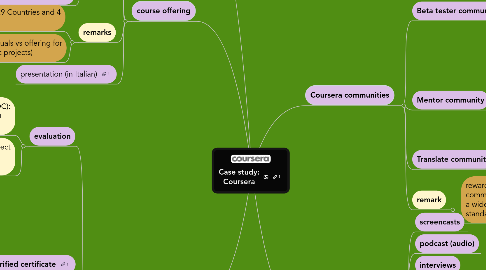
1. assessment and evaluation models
1.1. evaluation
1.1.1. generally (for each MOOC): scheduled assignments + final assignment
1.1.2. specializations: capstone project (application of knowledge / competences acquired)
1.2. verified certificate
1.2.1. requirements: earn a passing grade in the course; verify each assignment (through typing and webcam verification; pay the associated fee)
1.2.2. format: downloadable pdf; shareable on the job market (LinkedIn)
1.2.3. starting from $49 per certificate
1.2.4. ID verification: driver's licence / passport / national ID card / state or province ID card
1.2.5. additional insights/ info here
1.3. signature track
1.3.1. links coursework to learner's identity to show his/her achievements
1.3.2. initially available for selected courses from higher education institutions
1.3.3. price ranges from 30-100$
1.4. presentation - pros
1.5. presentation - cons
2. course offering
2.1. single courses
2.2. MOOC series (specializations)
2.2.1. targeted courses many topics, and especially in business, computer science, data science
2.2.1.1. e.g. Data science Spec.
2.2.1.2. e.g Agile Development Spec.
2.3. remarks
2.3.1. institutions from 29 Countries and 4 continents
2.3.2. offering for individuals vs offering for companies (ad hoc projects)
2.4. presentation (in Italian)
3. customer care tools (Coursera help center)
3.1. features
3.1.1. help articles
3.1.2. in case the user doesn't find the answer among the pre-defined ones, he/she can reach email and / or chat features
3.1.3. moderated forums (peer-to-peer support)
3.1.4. search bar among articles and forum records
3.2. remarks
3.2.1. help with compelling graphics
3.2.2. help only in English
3.2.3. no guidance / support to help students choose courses
3.2.4. when you audit a course, emails to teaching staff are not allowed
3.3. presentation - pros (in Italian)
3.4. presentation - cons (in Italian)
4. Coursera communities
4.1. Beta tester community
4.1.1. about curse content and platfrom features preview of alla material and features - it is possible to suggest improvement and to have dirct contat with developers and to have assistence
4.1.2. presentation (in Italian)
4.2. Mentor community
4.2.1. answering questions in the forum, sparking conversation, posting new threads, on specific topics whose they have knowledge, passeing feedback to coursera staff. There can be more than 1 mentor per course. Workload: roughly 3 hours per week
4.2.1.1. selection criteria not very clear: probably people enroll and Coursera staff assess resumes; maybe slow notification process
4.3. Translate community
4.3.1. to translate courses / synchronise subtitles
4.4. remark
4.4.1. reward: it seems that community members can access a wider number of pages than standard users
5. (video) content formats
5.1. screencasts
5.2. podcast (audio)
5.3. interviews
5.4. simulations
5.5. informal end-of-the week recorded discussions
5.5.1. remark
5.5.1.1. reflecting on MOOC lifecycle: sometimes it is useful to produce impromptu content (e.g. topical, up to date content). No matter if the "technical" quality of video is low

